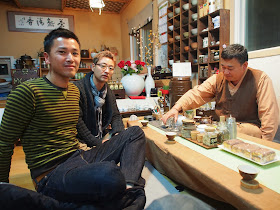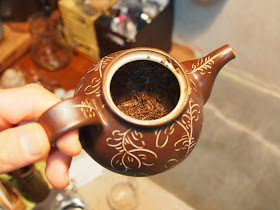 |
| Searching for tea in Naju |
Happy New Year dear readers! This blog has been dormant for awhile, partly because I only get time on the computer when our son Miles is sleeping, and partly because I've been busy updating
Facebook,
Google+ and
Twitter instead! I do find updating those platforms easier, and more immediately gratifying, as 5 mins spent uploading a photo gets lots of likes, comments & shares, whereas writing a blog post seems to take me an entire day! But a blog has the advantage of being able to delve deeper into a subject, so I thought I would take advantage of this holiday to share with you my recent tea adventure in South Korea. I visited the southern city of
Gwangju, about 5 hours drive south of Seoul, where I met with the Korean potter Hong Seong Il, and Warren Parsons, an American friend who works at the university there. Warren speaks Korean and has been studying the local history, so he was the perfect guide and took us to visit this little tea house in the ancient town of Naju, about an hour outside of Gwangju.
The tea master, Song Young Geon, is a first generation tea maker. He taught himself how to process tea, and has a license to pick tea trees that grow in forest on government land. He makes some nice hwangcha and black tea. I especially love his tea room, with its low table, and friendly cat.
 |
| The Master and Margarita |
Here are the tea bushes, growing on public land, in organic conditions. Not strictly wild, but they are untended most of the year, so are more "free in nature" than the usual neatly cropped hedgerows one finds in tea plantations. Anyone can hike up the mountain to enjoy these tea fields. Some tourists feel they are also entitled to pluck the bushes, much to the annoyance of the local tea makers.
 |
| Naju tea plantation (Photo by Warren Parsons) |
We enjoyed many cups of Mr. Song's yellow tea and big leaf black tea. I found his black tea very interesting, because of it's nutty & slightly medicinal bitter aftertaste. Unfortunately he's finding it financially difficult to make a living off tea, as not many tourists come to visit. According to Warren & Seong Il, young people in Korea are more interested in coffee than tea. Korean tea culture is seen as being a bit inaccessible and fuddy-duddy, with its highly ritualized tea ceremony & rules. Unlike China, where customers drink for free in the tea shop, then buy tea to take back home, in Korea you usually have to pay to drink in the tea house, and if guests purchase tea to take home, it's usually in small containers, not by the kilo. Tea appreciation remains a niche, sub-culture in Korea, and with limited high end tea production, good Korean tea is relatively expensive gram for gram.
 |
| Eugene & Seong Il drinking hwangcha (yellow tea) |
Despite the hardships, Master Song continues to make tea and keep tea culture alive in Naju. He has an aura of calmness about him, that makes time seem to pass slower. It will take more than money to convince him to give up his tea business.
 |
| Korean Tea Master Song Young Geon preparing his big leaf black tea |
 |
| Master Song also sells tea flowers, which are infused to make tea |
 |
| This charming pot helps you to appreciate the spirit of the tea |
 |
| Naju local speciality - delicious beef & rice broth! |
After filling ourselves with tea, Master Song took us to the center of town for a hearty beef, rice & scallion soup. Naju is known for its beef, and I enjoyed the light and simple flavours of this dish. The local kimchi was also especially strong, pungent and satisfying! I love how colour is used in Korean cooking, it subtly adds an extra dimension to the pleasure of eating. For those of you who would like to visit Master Song, his tea house is next to the Confucian Academy, in the old part of Naju town. Just look for the ancient gingko tree, towering over the temple wall. You can also contact
Warren, who organises english-speaking tours of Gwangju and it's surrounding area.
Special thanks to our tea friend Jeff Novick, for introducing us to Seong Il and Warren.

No comments:
Post a Comment